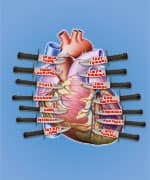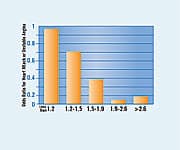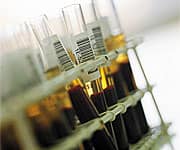Life Extension Magazine®
Evidence supporting the benefits of omega-3 fatty acids is so convincing that fish oil is the only dietary supplement the American Heart Association recommends people consider taking.1-3 The American Heart Association has a longstanding bias against dietary supplements. So when they publish about the importance of consuming omega-3s from fish or supplements, this is a ringing endorsement from an otherwise slow-to-react scientific organization. Both the Life Extension Foundation and American Heart Association recommend omega-3 fats based on the published literature showing that those who consume cold-water fish or fish oil supplements have markedly reduced rates of heart attack and stroke. While these studies present persuasive data, a missing piece of the puzzle is how much EPA and DHA is required in the blood to protect against coronary artery disease. Measuring EPA/DHA in Heart Attack Victims’ BloodA landmark study was recently published on 1,059 patients admitted to the hospital because of heart attack or unstable angina (chest pain from coronary artery occlusion).4 Blood samples taken from each of these patients were evaluated for conventional cardiac risk factors and also EPA/DHA content. Compared to age-matched controls, the risk of unstable angina or heart attack was reduced by an astounding 62% for every 1.24% increase in whole-blood EPA/DHA. As the chart on this page clearly shows, the risk of having a serious cardiac event plummets as blood levels of EPA/DHA increase.
Low Blood EPA/DHA: New Independent Cardiac Risk FactorWhen blood levels of EPA/DHA in these cardiac patients were matched against a control group, statistical analysis was able to show that low blood levels of EPA/DHA may be a new independent cardiac disease risk factor, at least in middle-aged patients. In this scenario, an “independent risk factor” means that even if other known promoters of coronary artery disease—such as cholesterol, LDL, and triglycerides—are in normal ranges, one’s risk of suffering a cardiac disease is still increased if blood levels of EPA/DHA are below the optimal range. In discussing the information gleaned from the study, the doctors noted that it supported earlier research published in the New England Journal of Medicine in 2002, showing lower blood levels of EPA/DHA in people who died suddenly from a heart attack, compared to controls.5
Guarding Against All Known Promoters of Coronary AtherosclerosisDespite greater awareness of cardiac risk factors, heart attack is still the number-one killer of men and women.6 Sadly, heart disease and stroke are largely preventable, if people only had their blood tested and took the appropriate actions when proven cardiac risk factors fall out of optimal ranges. Few physicians understand that coronary artery occlusion can result from any combination of 14 different causes. While protecting against some of the underlying causes may delay its manifestation, heart disease will strike a large segment of the aging population that does not take corrective actions ahead of time. The good news is that most underlying causes of coronary artery occlusion can be detected by comprehensive blood tests.
Based on the new finding that low blood levels of EPA/DHA may be an independent cardiac risk factor, we are adding “Low Blood EPA/DHA” to our evolving graphic of lethal daggers pointed at the aging heart. We are also factoring in the voluminous data showing that those who consume EPA/DHA in fish or supplements have significantly reduced coronary disease incidence.7-15 The vivid graphic on page six makes it clear that aging coronary arteries are vulnerable to occlusion from a variety of insults. Based on these findings, it is difficult to comprehend why anyone over the age of 40 would not have their blood tested once a year to find out if their coronary arteries may be silently occluding (narrowing). Control Your Own Cardiac DestinyThe annual blood tests recommended by the Life Extension Foundation are available at your doctor’s office, in hospitals, and through commercial testing laboratories. The most convenient way of obtaining the proper tests is to take advantage of the low prices offered by Life Extension’s nationwide blood-testing service. Just one phone call to 1-800-208-3444 enables an order to be placed for the comprehensive Male or Female Panel. Members are sent a computer-generated receipt that they take to a blood-drawing station that is often in their own neighborhood. No appointment is necessary. This means that members can pick a convenient time to have their blood drawn. The test results are usually mailed within 10 days. If there are any questions, Life Extension’s health advisors are available to answer them.
Each year at this time, we reduce our everyday low prices. Until May 31, 2007, we discount all blood tests so that members can obtain comprehensive blood evaluations at a fraction of the price charged by commercial laboratories. For example, members save as much as 80% on the Male or Female Panels compared to what commercial laboratories charge. If this editorial saves just one life by detecting a cardiac risk factor in time, then it was well worth publishing. Based on the number of Life Extension members who are now having their blood checked, I am convinced our message is helping to extend the healthy life span of many human beings. For longer life, P.S. Commercial tests of EPA/DHA blood levels are not yet available. To achieve higher blood levels, members are advised to consume about 1400 mg of EPA and 1000 mg of DHA each day. If triglyceride levels remain above 100 mg/dL of blood, even higher amounts of fish oil should be considered. | |||||||||
| References | |||||||||
| 1. Available at: http://www.americanheart.org/presenter.jhtml?identifier=1872. Accessed March 14, 2007. 2. Available at: http://www.americanheart.org/presenter.jhtml?identifier=4722. Accessed March 14, 2007. 3. Available at: http://www.americanheart.org/presenter.jhtml?identifier=4632. Accessed March 14, 2007. 4. Harris WS, Reid KJ, Sands SA, Spertus JA. Blood omega-3 and trans fatty acids in middle-aged acute coronary syndrome patients. Am J Cardiol. 2007 Jan 15;99(2):154-8. 5. Available at: http://content.nejm.org/cgi/content/abstract/346/15/1113. Accessed March 14, 2007 6. Available at: http://www.cdc.gov/nchs/products/pubs/pubd/hestats/finaldeaths04/finaldeaths04.htm. Accessed March 14, 2007. 7. Iso H, Kobayashi M, Ishihara J, et al. Intake of fish and n3 fatty acids and risk of coronary heart disease among Japanese: the Japan Public Health Center-Based (JPHC) Study Cohort I. Circulation. 2006 Jan 17;113(2):195-202. 8. Mozaffarian D, Ascherio A, Hu FB, et al. Interplay between different poly-unsaturated fatty acids and risk of coronary heart disease in men. Circulation. 2005 Jan 18;111(2):157-64. 9. Trichopoulou A, Barnia C, Trichopoulos D. Mediterranean diet and survival among patients with coronary heart disease in Greece. Arch Intern Med. 2005 Apr 25;165(8):929-35. 10. Calder PC. n-3 fatty acids and cardio-vascular disease: evidence explained and mechanisms explored. Clin Sci (Lond). 2004 Jul;107(1):1-11. 11. Yam D, Bott-Kanner G, Genin I, Shinitzky M, Klainman E. The effect of omega-3 fatty acids on risk factors for cardiovascular disease. Harefuah. 2001 Dec;140(12):1156-8, 1230. 12. Dewailly E, Blanchet C, Lemieux S, et al. n-3 fatty acids and cardiovascular disease risk factors among the Inuit of Nunavik. Am J Clin Nutr. 2001 Oct;74(4):464-73. 13. von Schacky C, Angerer P, Kothny W, Theisen K, Mudra H. The effect of dietary omega-3 fatty acids on coronary atherosclerosis. A randomized, double-blind, placebo-controlled trial. Ann Intern Med. 1999 Apr 6;130(7):554-62. 14. Das UN. Essential fatty acid metabolism in patients with essential hypertension, diabetes mellitus and coronary heart disease. Prostaglandins Leukot Essent Fatty Acids. 1995 Jun;52(6):387-91. 15. Garcia-Closas R, Serra-Majem L, Segura R. Fish consumption, omega-3 fatty acids and the Mediterranean diet. Eur J Clin Nutr. 1993 Sep;47 Suppl 1:S85-90. |






